Beggars (present British empire of wales+Scotland+Ireland) no chooser to pay
Beggars (present British empire of wales+scotland+ireland) no chooser to pay
Sorry, Shashi Tharoor, but Britain doesn’t owe India any reparations
Reparations for war have a long history – the British
liked to impose them at the drop of a hat, for example billing the
Tibetan government Rs. 2.5 million after invading Tibet in 1904.
Compensation for larger and more nebulous crimes is, like many ideas now
floating in the intellectual ether, American in origin. In Martin
Luther King Jr’s 1963 speech at the Lincoln Memorial, he said the
promise of ‘life, liberty and the pursuit of happiness’ was not being
fulfilled: ‘It is obvious today that America has defaulted on this
promissory note, insofar as her citizens of color are concerned.’
Ta-Nehisi Coates returned to the theme last year with an influential article in the Atlantic
suggesting the US needed a ‘national reckoning’ over the debts of
slavery. Coates has a point: anyone who passes time in the southern
states of America or in the Caribbean will notice the enduring
consequences of chattel slavery.
Tharoor’s demand that Britain should pay reparations to
India for historic damage rests, though, on insecure foundations. He
observed that India’s share of the world economy dropped from 23 to 4
per cent during the centuries of informal and formal British rule. This
change had more to do with the rapid economic transformation of western
Europe by the Industrial Revolution than it did with adjustments inside
India: a largely agricultural economy could not match an industrialising
one. His claim rests on the ‘drain theory’ — that Britain sucked away
India’s prosperity — proposed by late 19th century
nationalists like the Liberal MP Dadabhai Naoroji. When India gained
independence and the ‘drain’ stopped, there was no sign of the promised
surplus.
Tharoor argued that Britain owed a debt of £1.25 billion
to the Indian government at the end of the second world war for the 2.5
million volunteers who had fought the Axis powers, but it was ‘never
actually paid.’ Not only was this debt honoured, but it formed an
essential part of Jawaharlal Nehru’s early economic planning. The
governor of the Reserve Bank of India later complained that the new
prime minister had run through the sterling balances ‘as if there was no
tomorrow.’
Tharoor concluded his witty and entertaining
speech by saying his concern was not monetary value, but ‘the principle
that reparations are owed’ – saying he would be happy for India to be
paid £1 a year by Britain for the next 200 years. It was here that he
betrayed the essential frivolity of his case. He was appealing not for
the rebalancing of entrenched global financial structures that date to
the 18th century, but for moral
victory. Like a surface-to-air missile, he locked on to the spot where
he knew his well-heeled Oxford Union audience would be most vulnerable:
postcolonial guilt. It did the speaker no harm that his voice is of the
orotund type heard in early television documentaries about the royal
family. Tharoor told an Indian TV anchor that so many of the audience
trooped through the yes lobby in support of his reparations motion that
the ‘swank dinner’ following the debate was delayed.
The irony of the case for compensation is that it would
have made little sense to those who were actually subjects of the
British empire. Indian politicians in the 21st century
sometimes appear to be more anti-imperialist than their predecessors
who risked their lives for independence in the 1930s and 40s. For much
of his public career, Gandhi viewed the empire as a guarantor of his
civil rights. Even after spending eleven years in British jails, Nehru
was happy to toast the King Emperor and to make sure the Union Jack was
not lowered when the Indian tricolor was raised. The Indian National
Congress, the forerunner of Tharoor’s party, was for most of its
existence a collaborationist movement. India’s hereditary princes were
almost without exception imperialists. Only a small number of people in
the 20th century sought the violent
overthrow of British rule in India. Even nationalists who were
infuriated by the structural racism inherent in the empire often saw
empire as a progressive force. British rule in India was an act of
complicity, a joint venture between the elites of the two nations.
Today, all of that historical complexity has been forgotten: an attack
on the empire by a politician is a risk-free way of ensuring cross-party
unity and vigorous applause.
Paying a token reparation of £1 a year would be an
absurdity. It presupposes that the government which might have arisen in
India in the absence of the British would have been preferable to the
one that resulted. Particularly, it supposes that the alternative regime
would have produced comparable stability for the growth of internal
trade. At the start of the 18th century
after the depredations of the Mughal emperor Aurangzeb, the
subcontinent was in a state of bitter, broken conflict. In its wake,
outsiders from Europe were able to pay mercenaries to assert dominance
on their behalf. Looking forward towards the period after independence
in 1947, there is nothing in the conduct of the Congress party during
their long decades in power to suggest they might have used compensation
wisely or well. The 1970s marked a growth rate in India of below 1 per
cent. Nor is there the slightest chance that an expression of British
remorse for long forgotten political choices, which occurred at a
different time and in an entirely different historical context, would
engender any respect in India, a country with no tradition of
contrition. Being an Indian politician means never having to say you’re
sorry.
Patrick French is the author of India: A Portrait (Penguin)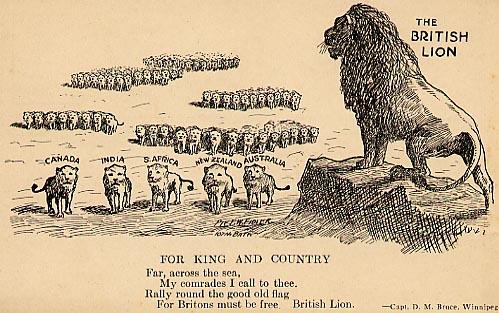

Sorry, Shashi Tharoor, but Britain doesn’t owe India any reparations
Reparations for war have a long history – the British
liked to impose them at the drop of a hat, for example billing the
Tibetan government Rs. 2.5 million after invading Tibet in 1904.
Compensation for larger and more nebulous crimes is, like many ideas now
floating in the intellectual ether, American in origin. In Martin
Luther King Jr’s 1963 speech at the Lincoln Memorial, he said the
promise of ‘life, liberty and the pursuit of happiness’ was not being
fulfilled: ‘It is obvious today that America has defaulted on this
promissory note, insofar as her citizens of color are concerned.’
Ta-Nehisi Coates returned to the theme last year with an influential article in the Atlantic
suggesting the US needed a ‘national reckoning’ over the debts of
slavery. Coates has a point: anyone who passes time in the southern
states of America or in the Caribbean will notice the enduring
consequences of chattel slavery.
Tharoor’s demand that Britain should pay reparations to
India for historic damage rests, though, on insecure foundations. He
observed that India’s share of the world economy dropped from 23 to 4
per cent during the centuries of informal and formal British rule. This
change had more to do with the rapid economic transformation of western
Europe by the Industrial Revolution than it did with adjustments inside
India: a largely agricultural economy could not match an industrialising
one. His claim rests on the ‘drain theory’ — that Britain sucked away
India’s prosperity — proposed by late 19th century
nationalists like the Liberal MP Dadabhai Naoroji. When India gained
independence and the ‘drain’ stopped, there was no sign of the promised
surplus.
Tharoor argued that Britain owed a debt of £1.25 billion
to the Indian government at the end of the second world war for the 2.5
million volunteers who had fought the Axis powers, but it was ‘never
actually paid.’ Not only was this debt honoured, but it formed an
essential part of Jawaharlal Nehru’s early economic planning. The
governor of the Reserve Bank of India later complained that the new
prime minister had run through the sterling balances ‘as if there was no
tomorrow.’
Tharoor concluded his witty and entertaining
speech by saying his concern was not monetary value, but ‘the principle
that reparations are owed’ – saying he would be happy for India to be
paid £1 a year by Britain for the next 200 years. It was here that he
betrayed the essential frivolity of his case. He was appealing not for
the rebalancing of entrenched global financial structures that date to
the 18th century, but for moral
victory. Like a surface-to-air missile, he locked on to the spot where
he knew his well-heeled Oxford Union audience would be most vulnerable:
postcolonial guilt. It did the speaker no harm that his voice is of the
orotund type heard in early television documentaries about the royal
family. Tharoor told an Indian TV anchor that so many of the audience
trooped through the yes lobby in support of his reparations motion that
the ‘swank dinner’ following the debate was delayed.
The irony of the case for compensation is that it would
have made little sense to those who were actually subjects of the
British empire. Indian politicians in the 21st century
sometimes appear to be more anti-imperialist than their predecessors
who risked their lives for independence in the 1930s and 40s. For much
of his public career, Gandhi viewed the empire as a guarantor of his
civil rights. Even after spending eleven years in British jails, Nehru
was happy to toast the King Emperor and to make sure the Union Jack was
not lowered when the Indian tricolor was raised. The Indian National
Congress, the forerunner of Tharoor’s party, was for most of its
existence a collaborationist movement. India’s hereditary princes were
almost without exception imperialists. Only a small number of people in
the 20th century sought the violent
overthrow of British rule in India. Even nationalists who were
infuriated by the structural racism inherent in the empire often saw
empire as a progressive force.
British rule in India was an act of complicity, a joint venture between the elites of the two nations. Today, all of that historical complexity has been forgotten: an attack on the empire by a politician is a risk-free way of ensuring cross-party unity and vigorous applause.
British rule in India was an act of complicity, a joint venture between the elites of the two nations. Today, all of that historical complexity has been forgotten: an attack on the empire by a politician is a risk-free way of ensuring cross-party unity and vigorous applause.
Paying a token reparation of £1 a year would be an
absurdity. It presupposes that the government which might have arisen in
India in the absence of the British would have been preferable to the
one that resulted. Particularly, it supposes that the alternative regime
would have produced comparable stability for the growth of internal
trade. At the start of the 18th century
after the depredations of the Mughal emperor Aurangzeb, the
subcontinent was in a state of bitter, broken conflict. In its wake,
outsiders from Europe were able to pay mercenaries to assert dominance
on their behalf. Looking forward towards the period after independence
in 1947, there is nothing in the conduct of the Congress party during
their long decades in power to suggest they might have used compensation
wisely or well. The 1970s marked a growth rate in India of below 1 per
cent.
Nor is there the slightest chance that an expression of British remorse for long forgotten political choices, which occurred at a different time and in an entirely different historical context, would engender any respect in India, a country with no tradition of contrition. Being an Indian politician means never having to say you’re sorry.
Patrick French is the author of India: A Portrait (Penguin)Nor is there the slightest chance that an expression of British remorse for long forgotten political choices, which occurred at a different time and in an entirely different historical context, would engender any respect in India, a country with no tradition of contrition. Being an Indian politician means never having to say you’re sorry.
British EMPIRE 1938
British lion then :-
British lion NOW
British EMPIRE 2018

Sep 5, 2013 - Russia mocked Britain today as “a small island no one listens to”, sparking a ... Mr Cameron has backed calls for military intervention in Syria after the ... “Britain will be one of the leaders in bringing forward plans for a peace ...
Missing: objects | Must include: objects
COMMENT:-
the little island WITH THE EGO OF AN EMPIRE WHERE SUN NEVER SET AND STILL WANTS TO DIVIDE INDIA WHENEVER POSSIBLE
..............................................................................................................................PSLV to launch two U.K. satellites today
A
PSLV (polar satellite launch vehicle) will be launched on September 16
night from the Satish Dhawan Space Centre in Sriharikota to put two
earth observation ...
ISRO's Commercial Arm Launches Two UK Satellites, Will Fetch Rs 200 Crore
The
Indian Space Research Organisation has launched two British satellites
tonight for which India will earn upwards of Rs 200 crore. It is the
44th launch of the ...
PSLV-C42 puts 2 UK satellites into orbit - The Hindu BusinessLine
https://www.thehindubusinessline.com/.../isro-launches...uk-satellites/article24965948....
5 days ago - The launch of two satellites of the United Kingdom — NovaSAR and S1-4 from Sriharikota Space Port on Sunday night by the Indian Space ...
ISRO's PSLV-C-42 launches two U.K. satellites - The Hindu
https://www.thehindu.com/sci-tech/.../isros-pslv...two...satellites/article24962349.ece
ISRO's PSLV-C-42 launches two U.K. satellites. T.K. Rohit. Sriharikota, September 16, 2018 22:56 IST. Updated: September 17, 2018 13:30 IST. Share Article ...
India's PSLV rocket successfully puts into orbit two UK satellites ...
https://www.firstpost.com › Technology News › Science

THEN WE CARRIED WHITE MEN AND WOMEN ON RICKSHAWS
NOW we carry satellites

גודל התצוגה המקדימה הזאת: 800 × 477 פיקסלים. רזולוציות אחרות: 320 × 191 פיקסלים | 640 × 381 פיקסלים | 1,024 × 610 פיקסלים | 1,280 × 763 פיקסלים | 9,606 × 5,725 פיקסלים.
ImageMapEditIndia yellow line was first super power of the world from A.D. 1 TO A.D. 1000
AFTER BRITISH LOOTING RULE FROM 1800 TO 1947 INDIA BECAME POOR
What is the evidence to show that the Britons had looted India? - Quora
Legacy of British Rule Is Still Holding India Back - Bloomberg
https://www.bloomberg.com/view/.../legacy-of-british-rule-is-still-holding-india-back
In terms PPP, Indian GDP will overtake USA by 2030, and go on to overtake China by 2050 as world’s largest economy.
According to a CITI Financial Services Group report summarized in REDIFF and reproduced below,
China should overtake the US to become the largest economy in the world by 2020,
then be overtaken by India by 2050.
Following will be the 10 largest economies in the world in 2050:
1. India: $85.97 trillion
2. China: $80.02 trillion
3. United States: $39.07 trillion
4. Indonesia: $13.93 trillion
5. Brazil: $11.58 trillion
6. Nigeria: $9.51 trillion
7. Russia: $7.77 trillion
8. Mexico: $6.57 trillion
US Will Be the World's Third Largest Economy: Citi - CNBC.com
https://www.cnbc.com/id/41775174
US will slip to world's third biggest economy by 2050 | Daily Mail Online
https://www.dailymail.co.uk/news/article.../US-slip-worlds-biggest-economy-2050.html
Feb 25, 2011 - 'China should overtake the US to become the largest economy in the world by 2020, then be overtaken by India by 2050,' Buiter predicted.Why India will be world's No. 1 economy by 2050 - Rediff.com Business
www.rediff.com › Business
NATURALLY WESTERN POWERS WILL TRY ALL DIRTY TRICKS TO KEEP CHINA AND INDIA FROM ACHIEVING THIS ,INCLUDING POLITICAL AND ECONOMICAL SABOTAGE
.looting of india by British :-
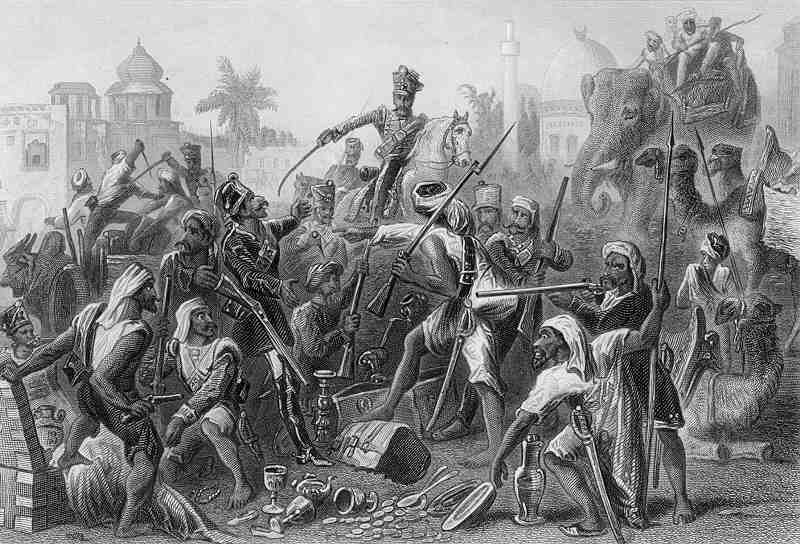
Source: ebay, Oct. 2001
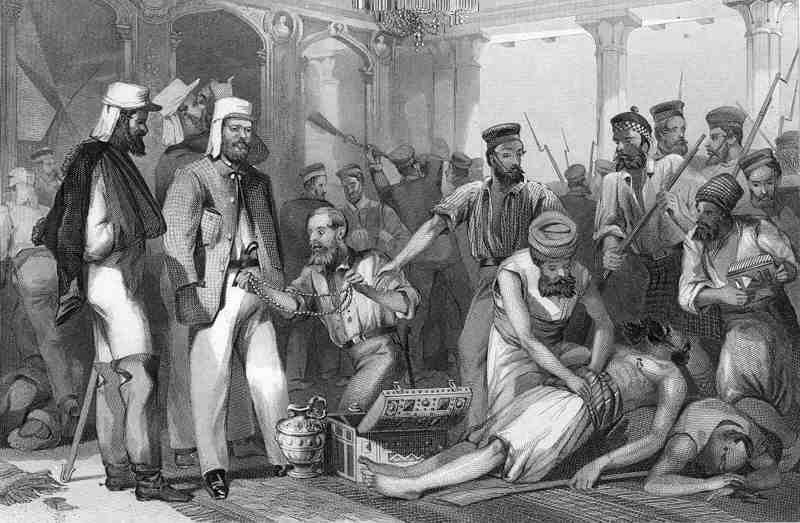
Source: ebay, Oct. 2001
"The engraving depicts the 'Times' correspondent looking on at the sacking of the Kaiser Bagh, after the capture of Lucknow on March 15, 1858. "'Is this string of little white stones (pearls) worth anything, Gentlemen?' asks the plunderer." From 'The History of the Indian Mutiny' by Charles Ball (London: London Printing and Publishing Co. Ltd., 1858).
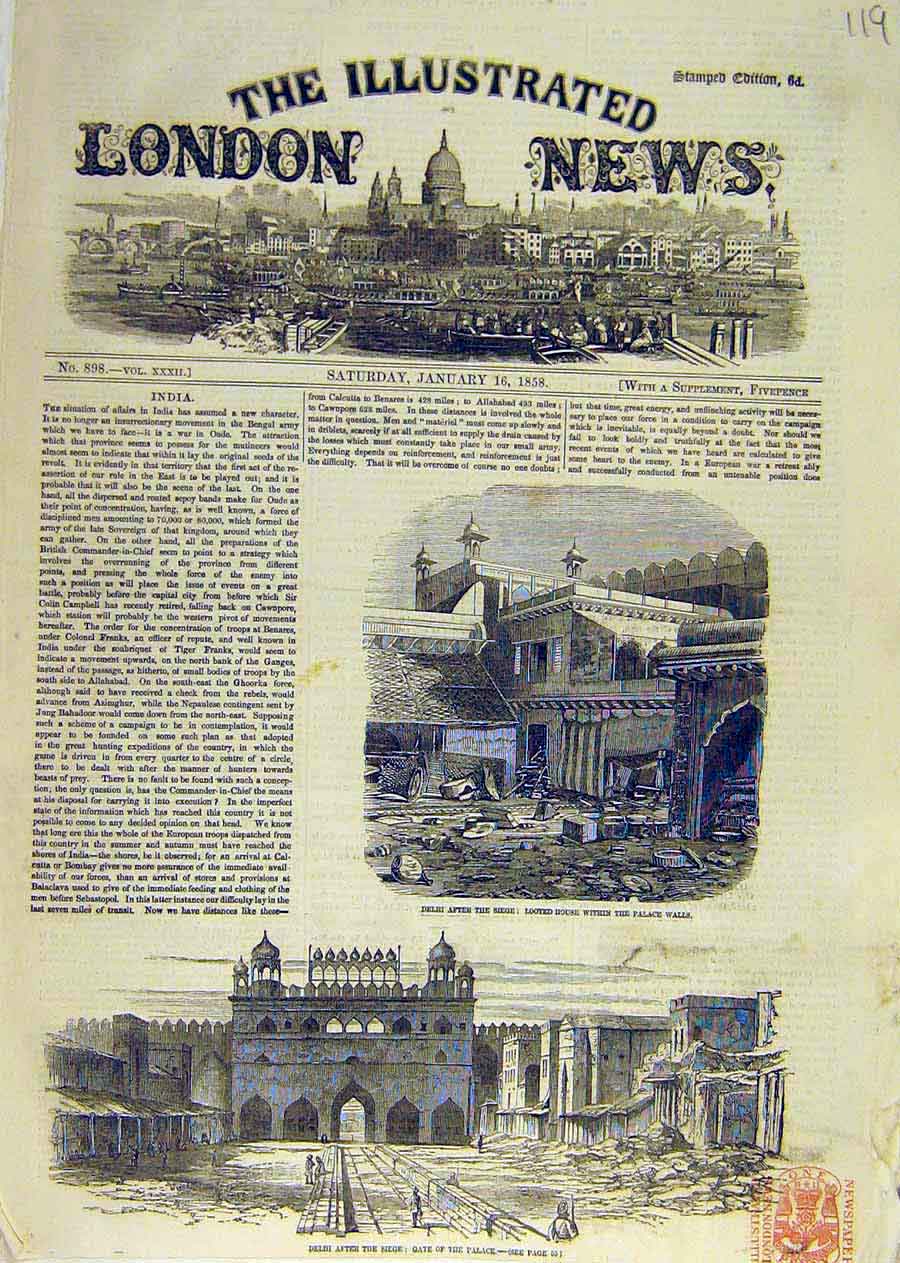
Source: ebay, Mar. 2010
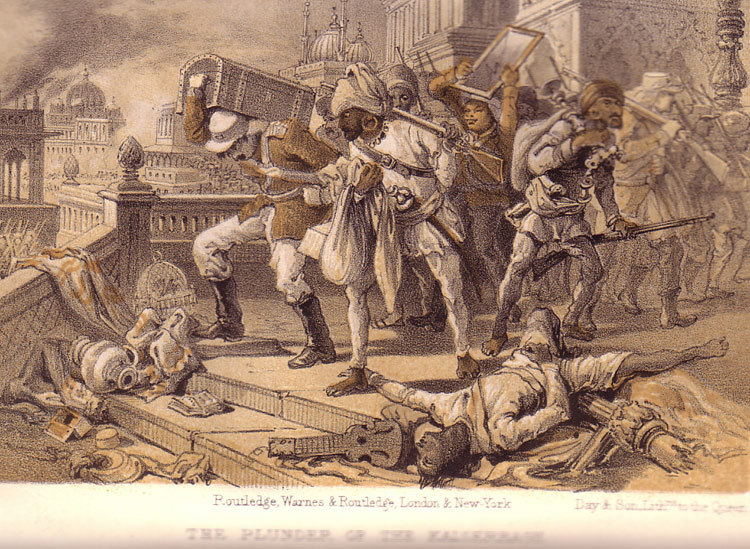
Source: ebay, Jan. 2007
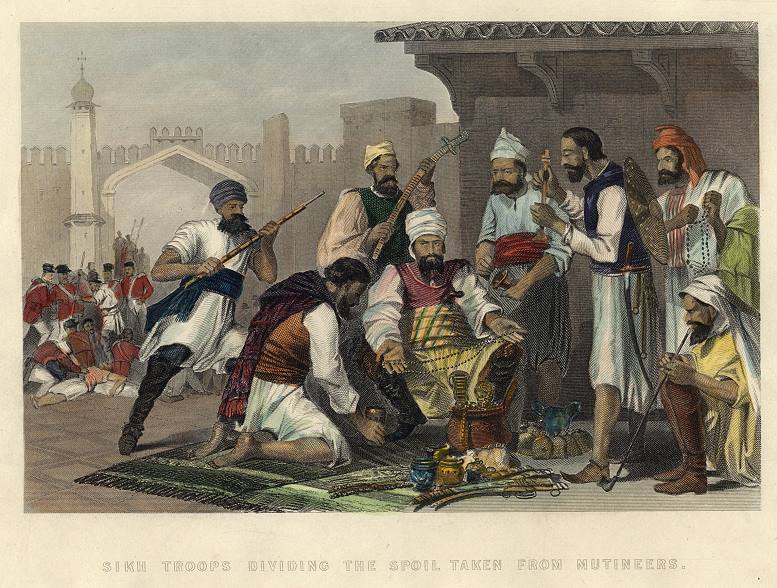
Source: http://www.antiqueprints.com/products.php?cat=34
(downloaded Dec. 2004)
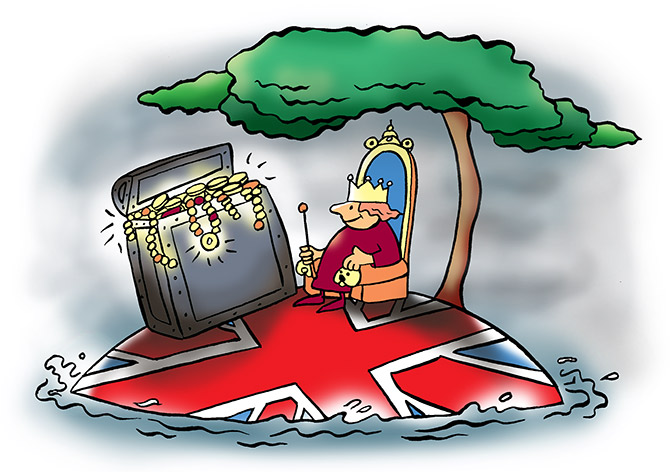
The ghost of colonial loot is coming back to haunt Britain - Rediff ...
Great Britain has looted a whopping 9.184 trillion pounds of wealth from India in a period of 173 years.
Just
to put things in a perspective, as per Wikipedia, Britain’s current
economy is worth 1.83 trillion pounds. In simple terms, the amount of
wealth Britain has drained out of India is worth several times the size
of that country’s GDP today. So, if Britain even tried to pay back that
money to India, its economy would collapse to a point of no return. The
estimate has been calculated by eminent economist Utsa Patnaik.
Will Britain ever be able to take off the burden of what it did to India? Above:
24th June 1939: The Viceroy of India, Lord Linlithgow (1887 - 1952), with his wife Lady Linlithgow © Getty Images Sourced from Sott.net
24th June 1939: The Viceroy of India, Lord Linlithgow (1887 - 1952), with his wife Lady Linlithgow © Getty Images Sourced from Sott.net
Patnaik
is Professor Emerita at the Centre for Economic Studies and Planning
(CESP), JNU. Patnaik said that the policies followed by Britain during
its colonial rule in India were so disastrous that per capita food
grains availability in India declined drastically from 197.3 kg per year
in 1909-14 to 136.8 kg per year in 1946.
In
India, just as also happened in many countries in the Caribbean, local
producers were set to work to produce commodities – particularly primary
commodities which the colonial powers could never produce themselves in
their home countries. The colonial powers then proceeded to appropriate
these commodities.
In the Indian case, this
appropriation took the form of getting Indian peasants and labourers to
produce an enormous global export surplus which earned gold and foreign
exchange. “But the whole of this global export surplus earnings
disappeared into the account of the Secretary of State for India in
London. Not a penny of it, of sterling or financial gold, was allowed to
flow back to the colonised country. Then how did the producers get
paid? Very clever. They got paid out of their own taxes!” said Patnaik.
Surplus
budgets were being operated systematically in British-ruled India for
the best part of 200 years. “When you tax a population and you do not
spend all the taxation within the country, but you set aside a third or
more for purchasing export goods, the operation of such surplus budgets
deflates mass incomes. It puts a tremendous squeeze on the peasantry.”
“No
country in the world today in the Global South has a per capita food
availability as low as the level India had reached by the year 1946.”
How
was this amount calculated? By estimating the present value of the
commodity export surplus - the estimate of 9.184 trillion pounds has
been arrived at by calculating the present value at a relatively low 5
percent interest rate.
(By
the way, Dadabhai Naoroji, one of the co-founders of Indian National
Congress in his book “Poverty And Un-British Rule In India” estimated
that the siphoning of wealth from India by the British was to the tune
of 4 million pounds a year.
Poverty and Un-British Rule in India : Dadabhai Naoroji : Free ...
: Free ...
May 8, 2009 - Book digitized by Google from the library of the University of Michigan and uploaded to the Internet Archive by user tpb.
his he calculated from the year 1857 onwards which went unabated till 1947. Assuming that the drainage was an estimated 2 million pounds a year from 1757 (Battle of Plassey) to 1856 and 4 million pounds from the year 1857 to 1947 as mentioned before, then the total amount swindled would be an astonishing eye-opener in today’s terms. Source: http://bwindia.net/content/briti...)
Poverty and Un-British Rule in India : Dadabhai Naoroji
https://archive.org/details/povertyandunbri00naorgoog
his he calculated from the year 1857 onwards which went unabated till 1947. Assuming that the drainage was an estimated 2 million pounds a year from 1757 (Battle of Plassey) to 1856 and 4 million pounds from the year 1857 to 1947 as mentioned before, then the total amount swindled would be an astonishing eye-opener in today’s terms. Source: http://bwindia.net/content/briti...)
British 'looters' kept the world's art safe | GulfNews.com
https://gulfnews.com/opinion/.../british-looters-kept-the-world-s-art-safe-1.2230981
UK investigates WW2 shipwreck looting claims - BBC News - BBC.com
https://www.bbc.com/news/uk-45238158
Aug 19, 2018 - The UK will investigate allegations that British World War Two wrecks in Asia have been targeted by scavengers, the defence secretary says.
The British Museum Returns Iraqi Antiquities Looted During the US ...
https://news.artnet.com/art-world/british-museum-repatriates-antiquities-iraq-1331390
What are the things stolen by the British during their governance ...
https://www.quora.com/What-are-the-things-stolen-by-the-British-during-their-govern...
Aug 31, 2015 - After the heroic death of the Tiger of Mysore – Tipu Sultan, the British forces took ... In 1851, it was displayed with other treasures of the Indian Empire at the ...Web results
Forget Kohinoor, The British Looted Greater Treasures From India
https://swarajyamag.com/.../forget-kohinoor-the-british-looted-greater-treasures-from-...
Apr 30, 2016 - The extent of British Plunder makes the Kohinoor appear a small loss. So let the Britishkeep the stone. The British caused irreparable losses to ...British museums shine thanks to all the loot from India | The Indian ...
https://indianexpress.com › Research › Express Originals
Aug 15, 2016 - In Britain, a museum visitor from India is suddenly made aware of how his or ... about the display of their national treasures in British museums.Web results
Not just the Kohinoor: Four other artefacts that India wants Britain to ...
https://scroll.in › Culture › History Revisited
Apr 22, 2016 - Not just the Kohinoor: Four other artefacts that India wants Britain to return ... is at the top of every list of national treasures that India wants back from its ... of India's lost or stolen artefacts, prompting British parliamentarian Keith ...On display here, wanted by India | The Independent
https://www.independent.co.uk › News › UK › Home News
Jun 1, 2010 - Some 150 years ago, a British engineer overseeing the construction of the ... "As efforts so far to reclaim stolen treasures have proved futile, ...The Stolen Wealth of India During British Rule! | Indian Defence Forum
https://defenceforumindia.com › Forums › Indian Affairs › Politics & Society
Dec 22, 2009 - The Stolen Wealth of India During British Rule Though it is a bitter ... to bring to account atrocities of the British and stolen national treasures.9 Priceless artifacts you didn't know India had - InstaBlogs - Global ...
https://instablogs.com/9-priceless-artifacts-know-india1.html
Aug 2, 2012 - The golden throne is king Ranjit Singh's another example of the British looting the magnificent treasures of India. A skilled yet hitherto unknown ...British Museum to display millennia-old looted treasures from ...
https://www.dailymail.co.uk/.../British-Museum-display-millennia-old-looted-treasures-A...
Mar 2, 2011 - 'Beautiful and priceless' ancient treasures stolen from Afghanistan on ... from 200-Searches related to indian treasures looted by british
5 Ways the British Empire Ruthlessly Exploited India | News | teleSUR ...
https://www.telesurtv.net/.../5-Ways-the-British-Empire-Ruthlessly-Exploited-India-20...
Legacy of British Rule Is Still Holding India Back - Bloomberg
https://www.bloomberg.com/view/.../legacy-of-british-rule-is-still-holding-india-back
Without strong data law, India will end up as a digital colony of US ...
https://blogs.timesofindia.indiatimes.com › Blogs › India Blogs
STORY -- CURSE OF THE KOHINOOR DIAMOND
It was the property of kakatiya kings of south india 1200 ADGOLCONDA FORT
The Khilji dynasty,commander Ulugh Khan in 1323 to defeated the Kakatiya king Prataparudra,and looted the kohinoor diamond
Sultan Ala-ud-din Khilji.
Next it is found in the hands of kachwaha kings of city of gwalior ;inherited by tomara kings of 14th century
Kachwaha fort at rohtas
tomb of king sikander lodi at delhi
Tomara kings were defeated by sikander lodi sultan of delhi & the diamond looted ;
Next it comes in the hands of moghal emperors
moghal emperor akbar
In 1734 nader shah of persia (iran)looted it from moghals,after destroying delhi and agra
Nader shah of persia
Next Nader shah is killed and the diamond comes into the hands of ahmed shah abdali of Afganistan
Ahmad shah abdali OF Afganistan
N ext in 1830 the deposed king shah shuja of Afganistan flees with the diamond
Shuja Shah Durrani of Afghanistan
N ext it comes in the hand of punjab king maharaja Ranjit king and on his death
Maharajah Ranjit singhit came in the
hands of the british
Queen Victoria
[ Many of the owners of the diamond had violent deaths ]
Now it is in british hands from 1840's
FUTURE:-
LET US WAIT AND SEE WHAT HAPPENS NEXT BECAUSE OF THE CURSE OF THE KOHINOOR;EVERYTIME SOMETHING TERRIBLE HAPPENED;TO THE OWNER OF THE DIAMOND WITHIN A SHORT TIME OF GETTING
THE DIAMOND.
EACH OF THE PREVIOUS OWNER'S(KING'S) KINGDOMS WERE DESTROYED AND THEIR EMPIRES ALSO WIPED OUT OR HAVE BECOME PART OF ANOTHER COUNTRY.
ALREADY BRITISH EMPIRE IS GONE .NOW WHAT WILL HAPPEN??
----------------------------------------------------------------------------------------------------------------
14 October 2012
Last updated at 23:47 GMT

The order will be debated in the House of Commons and House of Lords before going to the Privy Council for approval, which is likely to be given in February.
The transfer of powers includes all detail relating to the referendum.
MPs and peers will have no subsequent role in the process.
Rather, MSPs in the Scottish Parliament will debate the details of the poll - including the question, the timing and the franchise - in a Referendum Bill, which is expected to be introduced next spring.
Given that the Scottish National Party has a majority at Holyrood, it seems certain that the SNP policy of extending the vote to 16- and 17-year-olds will be approved.
The SNP's preferred timing for the poll, autumn 2014, is also likely to become law.
In the meantime, it is expected that the Scottish government will formally ask the Electoral Commission to "test" its proposed question.
The question which was outlined in the Scottish consultation on the referendum is: "Do you agree that Scotland should be an independent country?"
The testing by the Electoral Commission involves research with experts and with the public.
More likely they could accept the report, which might include tweaks to the the wording of the question, or they could suggest an alternative question.
The commission would then give its view on the alternative. If it had already considered that alternative during the initial testing period this could happen almost immediately, if not that process might have to begin anew.
Exactly how 16- and 17-year-olds would be enfranchised is complicated.
The challenge would be how to get them all on the electoral register in time for the poll.
The register is at present geared towards ensuring that all eligible voters are registered by the time they reach the voting age of 18.
Inconveniently, the 2014 canvas would have been held in the autumn, but changes being proposed in the Electoral Registration and Administration Bill presently being considered at Westminster would shift that year's canvas to April.
The age at which someone can first be listed on the register is complicated.
According to the Representation of the People Act 1983: "A person otherwise qualified is ... entitled to be registered in a register of parliamentary electors or local government electors if he will attain voting age before the end of the period of 12 months beginning with the 1st December next following the relevant date..."
In other words, not all 16- and 17-year-olds would be eligible under the present rules, which are reserved to Westminster.
Scottish independence: What are the legal steps to a referendum?

Regions of United Kingdom

|
A legal process takes place before electors vote in the referendum
The legal authority to hold a referendum resides with the UK parliament at Westminster.
On Monday, the prime minister David Cameron and Scotland's
first minister Alex Salmond signed an agreement which temporarily
transfers that authority to the Scottish Parliament, using an order
under Section 30 of the Scotland Act 1998.The order will be debated in the House of Commons and House of Lords before going to the Privy Council for approval, which is likely to be given in February.
The transfer of powers includes all detail relating to the referendum.
MPs and peers will have no subsequent role in the process.
Rather, MSPs in the Scottish Parliament will debate the details of the poll - including the question, the timing and the franchise - in a Referendum Bill, which is expected to be introduced next spring.
Given that the Scottish National Party has a majority at Holyrood, it seems certain that the SNP policy of extending the vote to 16- and 17-year-olds will be approved.
The SNP's preferred timing for the poll, autumn 2014, is also likely to become law.
In the meantime, it is expected that the Scottish government will formally ask the Electoral Commission to "test" its proposed question.
The question which was outlined in the Scottish consultation on the referendum is: "Do you agree that Scotland should be an independent country?"
The testing by the Electoral Commission involves research with experts and with the public.
Electoral Commission guidelinesIn assessing the referendum question it must....
- be easy to understand
- be to the point
- be unambiguous
- avoid encouraging voters to consider one response more favourably than another
- and avoid misleading voters.
The process could take up to 12 weeks, after which the commission will submit a report to the Scottish government.
The recommendations are advisory, not binding, and ministers could theoretically choose to ignore them.More likely they could accept the report, which might include tweaks to the the wording of the question, or they could suggest an alternative question.
The commission would then give its view on the alternative. If it had already considered that alternative during the initial testing period this could happen almost immediately, if not that process might have to begin anew.
Exactly how 16- and 17-year-olds would be enfranchised is complicated.
The challenge would be how to get them all on the electoral register in time for the poll.
The register is at present geared towards ensuring that all eligible voters are registered by the time they reach the voting age of 18.
The ballot paper question as proposed by the Scottish government earlier this year
Ordinarily the electoral roll is canvassed annually, although
individual voters can register up to 11 working days before any poll.Inconveniently, the 2014 canvas would have been held in the autumn, but changes being proposed in the Electoral Registration and Administration Bill presently being considered at Westminster would shift that year's canvas to April.
The age at which someone can first be listed on the register is complicated.
According to the Representation of the People Act 1983: "A person otherwise qualified is ... entitled to be registered in a register of parliamentary electors or local government electors if he will attain voting age before the end of the period of 12 months beginning with the 1st December next following the relevant date..."
In other words, not all 16- and 17-year-olds would be eligible under the present rules, which are reserved to Westminster.
More Scotland politics stories
RSS-
A deal setting out terms for a Scottish independence referendum is signed by Prime Minister David Cameron and First Minister Alex Salmond. Scottish referendum deal struck
Scottish referendum deal struck
WILL BRITAIN AS A NATION WILL ALSO DISAPPEAR AS PART OF THE EUROPEAN UNION?
Can't return Kohinoor diamond to India: Britain
The UK has rejected India’s fresh demand to return its priceless
artefacts like Kohinoor diamond and Sultanganj Buddha “stolen” during
the British colonial rule, citing a law that prevents it from giving
back the items.
“The British Museum Act 1963 prevents our national museums from removing
items...the government has no plan to change the law,” the Foreign and
Commonwealth Office said.
It made the statement in response to an appeal by Gautam Sengupta,
Director—General of Archaeological Survey of India (ASI). The ASI is
planning to join a campaign with the support of UNESCO and other
countries to get back the artefacts.
In an interview to The Independent, Mr. Sengupta had said, “As efforts
so far to reclaim stolen treasures have proved futile, UNESCO support is
required for launching an international campaign to achieve this end”
as India’s treasures held abroad are “too long to handle” and require
“diplomatic and legal campaign“.
Decisions taken by museum trustees
The British Foreign and Commonwealth Office spokeswoman said that there
is a strong public feeling on the restitution debate and decisions are
taken by museum trustees in which politicians do not interfere.
“It’s a long—established principle in the UK, supported by successive
governments.” The British law only permits return of human remains and
objects lost during the “Nazi era“.
Mughal era’s Kohinoor diamond, Sultanganj Buddha, rechristened as the
Birmingham Buddha, Amravati railings, a series of limestone carvings
dating back to 100 AD, Saraswati idol, a sculpture of the deity from the
Bhoj temple, are among the items on the ASI’s list.
There is a mounting pressure on the erstwhile colonial countries to
restitute heritage items as “not only India, various countries like
Mexico, Peru, China, Bolivia, Cyprus and Guatemala also voiced similar
concern” and are planning to join the UNESCO campaign, the ASI chief
said.
















